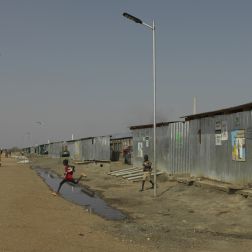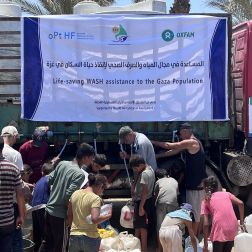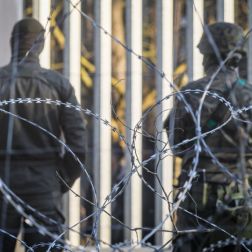- 5 mins read time
- Published: 19th June 2020
Mariam, Burkina Faso

The music has stopped in the heart of the desert, the savannahs, and forests of the Sahel and the Central African Republic - taking with it the joy of better days. Fear has spread across the region, and people are facing it on two fronts: firstly, where armed groups devastate villages, driving more than five million people to flee their homes. Secondly, the rise of COVID-19 is creating additional fear and uncertainty amongst communities.
And for the majority of displaced women, their dance partners have also disappeared. Many men of working age have been killed by armed groups, disappeared or have left in search of a better future. In Burkina Faso, women and children represented 84 per cent of the displaced population. Women find themselves in extremely precarious situations, struggling for their survival and for those depending on them. Many bear the scars – visible and invisible - of acts of violence. In the Central African Republic, a woman is victim of sexual and gender-based violence almost every hour.
These Sahelian and Central African women are hundreds of thousands, survivors and heroes - waiting for music to resume in their lives. Whilst they do not sing, they still have their stories, and hope, to imagine another future.
A team of female humanitarian workers with Oxfam collected the following stories. They are accompanied by illustrations made by the artist Sophie Le Hire, who has lived in Senegal for four years and who, in her artistic approach, proudly carries the voice of women, whom she considers as "giants". By juxtaposing two styles, she illustrates the reality of the present and the dream for the future of these women

Mariam*, Burkina Faso
“We are in the crossfire: behind us there are attacks, in front of us is the disease. How will we cope? I will be so glad when this illness ends.”
My name is Mariam. I am 25 years old, and I come from the Center-Nord region in Burkina, near Dablo.
My dream was to have a high school diploma. I became a mother while still in school but I hung on and continued until 10th grade. However, in April they closed the school - because of insecurity classes stopped completely.
I wanted to be either a teacher – to educate children and to share knowledge with them – or to be a doctor and to save lives. All of this fell apart.
When attacks by armed groups became more and more frequent, I chose to flee my home so that I would not end up like so many other victims of violence or rape.
Everyday life is not easy here. We don't have enough to eat, and I have to ration our lunch if I want something left to eat in the evening. There is no firewood and, as a woman, I am afraid when I have to go and collect it in the bush; I do not feel safe. To survive, I try to do laundry in town for other families, or pound millet or sorghum for 500 CFA [0.83 USD]. At the moment, we need support for everything: water, food, shelter.
With the arrival of COVID-19, our life has changed: markets are closed, and with it any place where we can find work. Preventative measures have changed our daily lives. We can no longer move around when and where we want to. To protect my family, we wash our hands regularly before doing anything else: cooking, eating, going to the toilet.
The disease has made our lives more difficult, especially when it comes to accessing water. So as to avoid finding ourselves in a crowd, we leave at dawn to go to the well. If there are a lot of people, we leave the cans at the well and return to the house.
We urgently need water and hygiene kits - if we were able to get these items, it would improve our daily lives.
Interview by Syntyche Ouedraogo, Oxfam in Burkina Faso.
*Name has been changed to protect identity
Oxfam’s response
In the Sahel and the Central African Republic, Oxfam provides humanitarian aid and carries out advocacy actions for communities affected by large-scale humanitarian crises. Women and girls are the most exposed in crisis and it is fundamental that their specific needs and their protection are at the heart of humanitarian responses. Women also play a major role in developing social cohesion and peacebuilding.
Oxfam and its local partners provide humanitarian aid to more than 400,000 internally displaced people (IDPs) and host communities in the region, in terms of food aid, access to water, hygiene and sanitation and to protect the most vulnerable, especially women and girls. Oxfam also work alongside communities in conflict transformation programs to foster cross-border dialogues and the inclusion of women and young people in peacebuilding processes.
Since the arrival of the COVID-19, Oxfam has adapted its programs to protect the poorest and most vulnerable against this new threat. Oxfam also distribute hygiene kits to schools and health professionals and take action to ensure clean and safe water continues to flow.




